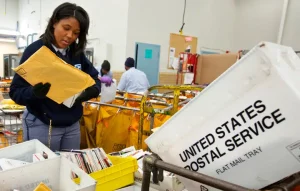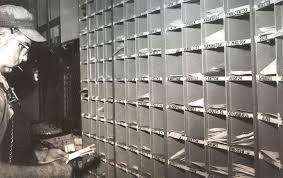
I’m driving to work at the main post office in downtown Indianapolis. I should be in college for my senior year, but I have been suspended due to my participation in disruptive protests during Nixon’s invasion of Cambodia in the spring of 1970.
Indianapolis is my hometown. I’m back in the house, living with my parents and two younger siblings. I have taken a civil service test, gotten a high score, and earned a full-time job (a career appointment, as it’s called) as a letter carrier. The guys I work with predict that I won’t go back to school once I get accustomed to making that hefty wage of $3.51 an hour and seeing it in my paycheck every other week.
In my memories of driving south on Allisonville Road to Fall Creek Boulevard and then into the central part of the city, it is sometimes raining and other times dry, but always it is dark–pitch dark. And on the car radio, I hear the dulcet tones of young Michael Jackson—a Hoosier like me. He is still a member of the Jackson Five and his voice is imprinted on my memory: “You and I must make a pact. We must bring salvation back. Where there is love, I’ll be there…”
My position requires me to clock in at the postal garage no later than 4:30 AM, six days a week. Once I’ve done that, it’s time to locate my three-quarter ton truck and start the engine. I guess there was no fear of overnight vehicle rustlers in downtown Indy, because the ignition keys are sitting right there on the dashboard.
Learning to drive the truck had been a surprisingly relaxed process, thanks mostly to the middle-aged, diminutive white letter carrier who had the responsibility to spend a few hours getting me up-to-speed on it. His last name was Foley, and that’s the only name I ever heard people call him. Foley had a stutter and to me, seemed remarkably comfortable with it. Anyone who was sentient in Indianapolis in 1970 knew the name A.J. Foyt, who won the Indianapolis 500 Mile Race three times in the 1960s. When, under Foley’s tutelage, I was having a bit of difficulty backing the truck out from a parking spot, he reassured me that, “E-e-ven A.J. F-f-f-oyt would make a f-f-few mistakes.” The next day, I picked up a form he had signed to verify that I was approved to drive the truck independently. With the form was a friendly note, wishing me well. He had signed it in his own cursive hand, last name only: “F-f-f-foley.”

Mail handlers move the mail around to wherever it goes next–the cancellation machine, the loading dock, or to the carrier stations
In October of 1970, I am the very first letter carrier in the Indianapolis post office to begin my shift each morning. I don’t mean just in the downtown station; I mean in the whole city. There are clerks and mail handlers and supervisors who work overnight, but the carriers mostly come on at six in the morning, at the substations as well as the main downtown P.O. My shift begins earlier because my deliveries are deemed to be unusually critical. If someone in Indiana was writing to their state senator or state representative between September 1970 and January 1971, I was the man bringing their letter to the right place.
I am dropping off bags of mail at the state capitol, the Governor’s Mansion, and the State Library. These institutions each have their own employees coming in early to sort the morning mail. They count on the man in my position to get the bags of mail there in plenty of time. My shift begins so early that if I wake up feeling sick or for some other reason cannot make it to work, there is no supervisor on duty to call. Instead, I am to call a man named Richard–the carrier who had most recently held the same position. I am supposed to reach him the night before, if possible, to give him time to rearrange his plans for the morning.
Once I have the truck revved up, I drive just a mile away and park in the indoor parking lot of the downtown post office. I go inside, greet the overnight clerks sorting mail, and find the bags of mail that are for my route, already pulled together and closed and labelled, for the Governor and the other state offices. The State Library always has the most voluminous mail because they are the source of Braille materials. People who are blind can borrow and return materials by mail from anywhere in the state of Indiana. I learn from one of the other carriers that this is a free service. At least it was back then. A book or magazine republished in Braille is substantially thicker than the original, so that makes for some considerable amount of mail.
 It was not challenging to complete the run to those state institutions on time. By 6:30 am, I am back at the main station and ready to fulfill my next role—not as a deliverer of mail but as a “relay man.” This is my most fun time of the day, as I get to relax and be a “fly on the wall” and listen to the colorful banter of the other letter carriers. They have mostly clocked in at 6:00 am and now they’re sorting mail at their individual workstations as they keep up an endless stream of conversation. I call it “conversation” but nobody is talking one-on-one; it is a sort of “group conversation” like you might have at a small dinner party, but at this dinner party, nobody can see each other. Each man concentrates on sorting letters properly within his own workstation. When someone speaks up, he is sort of “broadcasting” to the 8 or 10 carriers nearby. He strives to keep his contribution to the dialogue loud enough for them all to hear, interesting enough that it will be worthwhile straining a bit to hear it, and concise enough to give all the brothers a chance to speak.
It was not challenging to complete the run to those state institutions on time. By 6:30 am, I am back at the main station and ready to fulfill my next role—not as a deliverer of mail but as a “relay man.” This is my most fun time of the day, as I get to relax and be a “fly on the wall” and listen to the colorful banter of the other letter carriers. They have mostly clocked in at 6:00 am and now they’re sorting mail at their individual workstations as they keep up an endless stream of conversation. I call it “conversation” but nobody is talking one-on-one; it is a sort of “group conversation” like you might have at a small dinner party, but at this dinner party, nobody can see each other. Each man concentrates on sorting letters properly within his own workstation. When someone speaks up, he is sort of “broadcasting” to the 8 or 10 carriers nearby. He strives to keep his contribution to the dialogue loud enough for them all to hear, interesting enough that it will be worthwhile straining a bit to hear it, and concise enough to give all the brothers a chance to speak.
I say, “all the brothers,” because at least two-thirds of the carriers at the downtown station are African-American men, and they set the tone and the style for the conversational interchange. They range in age from late 20s to mid-50s. There are a few white guys, one or two white women and no Black women carriers at the station at that time—though several women of color were working nearby as clerks or mail handlers.
“I hear the Inspectors be comin’ around starting next week,” one guy calls out.
“Oh,” retorts another, “I gotta look in my closet and get out them slow walkin’ shoes!”
“Right,” comes another voice. “Them deliveries be takin’ a lot o’ extra time when the Inspector comin’ around.”
“Your slow walkin’ shoes be leather shoes, or sneakers?” someone calls out. ”Can’t no sneakers be slow enough,” another voice chimes in, “Gotta be some heavy damn leather, heavy damn, slow walkin’ leather.”
Obie, one of the few men who might be over sixty, pipes up, casting one eye in my direction. He had noticed me looking around quizzically during this discussion about inspectors and shoes. “College boy wanna know wny folk be walkin’ slow when the Inspector come around.”
“Who college boy?” This from one of the two men named Woods—one is Kenny and one is Eddie, not related. “You don’t know college boy?” Obie answers. “811!”
Every run in a truck has a number, and my early morning run was number 811. “811 a college boy?” Kenny asked—I’m thinking the taller one is Kenny Woods and the shorter one is Eddie. “Didn’t know that. He go down to Bloomington?” He is referring to the main campus of Indiana University, less than 2 hours south of Indianapolis, where a ton of my North Central High School (class of 1967) friends are attending. “Nah, 811 too smart for Bloomington. He goin’ somewhere out East. Right, college boy?” “Yes, I go to a school in Boston.” “Boston! You root for them Red Sox?” “Who care about who he root for? You can ask him later. He wanna know about them slow walkin’ shoes.” “I’ll tell ‘im,” says the shorter guy named Woods, whom I think is Eddie.
He leaves his case, comes over to me and explains privately about the whole inspector thing. An inspector comes from outside the local postal station and walks the whole route with each letter carrier, once every two years or so. This is an effort to ensure that each route requires roughly the same amount of time and effort as any other route. Some neighborhoods get more populated—with new homes or apartment buildings added—while others get depleted, with homes abandoned or businesses expanded to take over parcels that were formerly residential. As these concentrations of addresses ebb and flow, it is natural that the boundaries of the various walking routes (driving routes too) need to be redrawn to maintain overall equivalence.
No carrier would object if an inspector found he had too many deliveries on his route and had to take some away. Their fear was of the opposite—that an inspector would conclude that a route needed to take on additional addresses, or more likely entire blocks of additional addresses, to bring it up to the standard.
Given this situation, every letter carrier’s hope was to make their route seem as time-consuming as possible when the inspector came around—thus the need for those ‘slow walking shoes.’ But then all the rest of the time, each one developed as many shortcuts as possible to reduce the time required. Most guys could finish their routes fast enough to take a two-hour lunch instead of the 30-minute paid lunch that was authorized and still come back to the station and clock out at the expected time. This explained why, any time I took over someone’s deliveries for the day, they would always caution me not to come back to the station till at least three o’clock. It wouldn’t do for the boss man to see a greenhorn knock out the whole route faster than the regular man.
When an inspector showed up, as Mr. Woods explained to me, all the shortcuts a carrier normally used went out the window. The aim was to convince the inspector that making deliveries on his route required every minute that it was currently allotted, maybe even more. Make it look like he had a hard time even squeezing in that thirty-minute lunch. I expressed my appreciation for his letting me in on what they were discussing. As he returned to his case, the banter had not ceased.
“Better tell my girlfriend I won’t be home till 4’o’clock when that Inspector come around,” chimes in another man. “What she goin’ think when you spendin’ more time with the inspector than you spend with her?” “My girlfriend ain’t stupid! She know she can’t add on no streets to my route! Inspector can!”
“She can’t add nothing on your streets, brother man. But she can take away something under your sheets!” Another voice reprises the comment with a raucous laugh. “Brother man worried about somebody f-ing with his streets. He better start worrying what’s underneath his sheets.” And so it went, not just that day but every day, The rhythmic, evocative, well-informed, loud, humorous repartee of the hardworking letter carriers of central Indianapolis.
Dale Borman Fink retired in 2020 from Massachusetts College of Liberal Arts in North Adams, MA, where he taught courses related to research methods, early childhood education, special education, and children’s literature. Prior to that he was involved in childcare, after-school care, and support for the families of children with disabilities. Among his books are Making a Place for Kids with Disabilities (2000) Control the Climate, Not the Children: Discipline in School Age Care (1995), and a children’s book, Mr. Silver and Mrs. Gold (1980). In 2018, he edited a volume of his father's recollections, called SHOPKEEPER'S SON.



Wonderful story wonderfully told Dale!
I can hear the good-natured banter of your co-workers at the PO, and can see that young college kid taking it all in!
So glad you posted this—you really paint the picture. It does indeed resonate with my experience at the post office and you tell it well. However, I was impressed with the special service for the legislators and how the post office has become diminished over the years, due to various factors. Kind of sad.